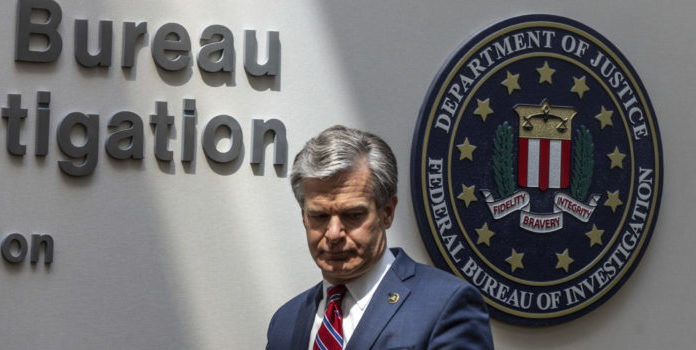(John McCann, Headline USA) Despite being heavily redacted, the sparse contents of the Mar-a-Lago FBI raid affidavit has shown clear evidence of the Justice Department’s manipulation and weaponization of the criminal code.
When the affidavit hit the public docket on Friday, the un-redacted sections claimed that this FBI investigation resulted from a referral from the National Archives and Records Administration. A referral that the DOJ received on Feb. 9, 2022.
The affidavit opened by stating, “the government is conducting a criminal investigation concerning the improper removal and storage of classified information in unauthorized spaces, as well as the unlawful concealment or removal of government records,” as reported by The Federalist.
The document summarized the referral by explaining that, “highly classified records were unfoldered, intermixed with other records, and otherwise unproperly identified.” But, it is the disclosures later in the affidavit that showed the administration’s hand.
The DOJ sought to use the Presidential Records Act as their justification to raid the former president’s home. The PRA stipulates that “documents created or received by the president or his immediate staff, such as memos, letters, notes, emails, and other written communications, related to a president’s official duties, constitute ‘presidential records’ and must be preserved.” The PRA excludes specific documents such as “official records of an agency” or “personal records.”
While the PRA is federal statute, it is not a criminal statute and violations do not constitute a federal crime. Furthermore, the affidavit only gives a broad indication of ‘presidential records’ and does not provide a specific example of a violation.
The PRA does not outline such a broad interpretation. Lastly, the courts have thus far refused to question a former president’s understanding of what is personal or presidential record.
President’s are vested with the highest authority of what documents remain classified or declassified. A former president who is in possession of classified records is not “subject to criminal sanction.” Any attempt to implicate a president on matters of record classification liability would cause “grave constitutional separation-of-powers issues,” according to Trump’s lawyer Evan Corcoran.
Regardless, whether the documents demanded by the NARA referral were classified or not, former President Trump should be under no criminal liability. The DOJ lacked probable cause based on the supposed violation of mishandling of documents. Knowing this, the DOJ attempted to justify the raid by using the Espionage Act. This act only applies to individuals who are unauthorized to share classified information. How is a former president not authorized?
The FBI argued that the documents contained matters of national defense and that they had “probable cause to believe that evidence of obstruction” would be found at Mar-a-Lago. The FBI manipulated their investigation in order to justify the raid despite no provable and probable cause to search Trump’s home.
The FBI bent and twisted the words of the law in order to go after a former president and chief political adversary of the current administration, in hopes of finding something that would stick. That’s a troubling development for every citizen.

